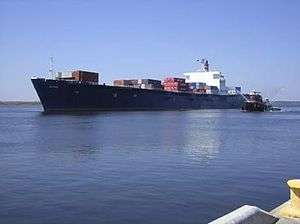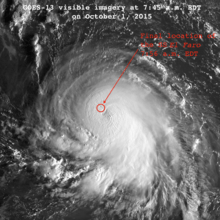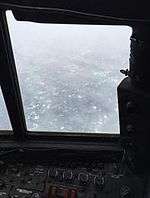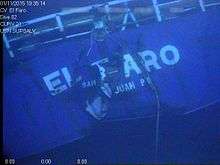SS El Faro
 | |
| History | |
|---|---|
| Name: |
Puerto Rico (1975–1991) Northern Lights (1991–2006) El Faro (2006–2015)[1] |
| Owner: | TOTE Maritime |
| Operator: | Sea Star Line |
| Port of registry: | San Juan, Puerto Rico, U.S.[1] |
| Route: | Jacksonville, Florida to San Juan, Puerto Rico |
| Ordered: | 1973 |
| Builder: | Sun Shipbuilding & Drydock Co.[1] |
| Yard number: | 670[2] |
| Laid down: | April 11, 1974[2] |
| Launched: | November 1, 1974[2] |
| Completed: | January 16, 1975[2] |
| Identification: |
Call sign: WFJK |
| Fate: | Sank in Hurricane Joaquin on October 1, 2015[3] |
| General characteristics [1] | |
| Type: | Roll-on/roll-off cargo ship |
| Tonnage: |
31,515 GT 21,473 NT 14,971 DWT |
| Length: | 241 m (791 ft) (after lengthening) |
| Beam: | 28.6 m (94 ft) |
| Depth: | 12.8 m (42 ft) |
| Propulsion: | Single shaft, double reduction compound steam turbine (11,190 kW) |
| Speed: | 22 knots (41 km/h; 25 mph) |
| Crew: | 33 personnel (28 Americans and 5 Poles) on final voyage |
El Faro was a United States-flagged, combination roll-on/roll-off and lift-on/lift-off cargo ship crewed by U.S. Merchant Mariners. Built in 1975 by Sun Shipbuilding & Drydock Co. as Puerto Rico, the vessel was renamed Northern Lights in 1991, and finally, El Faro in 2006. It was lost at sea with all hands on October 1, 2015, after losing propulsion during Hurricane Joaquin.
El Faro departed Jacksonville, Florida, bound for Puerto Rico on the early morning of September 30, 2015, when then-Tropical Storm Joaquin was several hundred miles to the east. The following morning, after Joaquin had become a Category 3 hurricane, the vessel likely encountered swells of 20 to 40 ft (6 to 12 m) and winds in excess 80 kn (150 km/h; 92 mph) as it sailed near the storm's eye. Around 7:30 a.m. on October 1, the ship had taken on water and was listing 15 degrees. The last report from the captain, however, indicated that the crew had contained the flooding. Shortly thereafter, El Faro ceased all communications with shore.
On October 2, the ship was declared missing, and an extensive search operation was launched by the United States Coast Guard, with help from the Air Force, Air National Guard, and Navy. They recovered debris, a damaged lifeboat, and an unidentifiable body. El Faro was declared sunk on October 5. The search was called off at sunset on October 7, by which time more than 183,000 sq nmi (630,000 km2; 242,000 sq mi) had been covered by aircraft and ships. The Navy sent the USNS Apache to conduct an underwater search for El Faro on October 19, 2015.[4] The Apache identified a vessel on October 31 "consistent with [the El Faro] cargo ship...in an upright position and in one piece."[5] The next day, November 1, 2015, the Navy announced a submersible had returned images that identified the wreck as the El Faro.[6]
Construction and earlier career
El Faro was built by the Sun Shipbuilding and Drydock Corporation in Chester, Pennsylvania, in 1975 as Puerto Rico.[1] As operated by the Navieras de Puerto Rico Steamship Company, the Puerto Rico hauled cargo to and from the U.S. East Coast for 15 years. In 1991, it was purchased by Saltchuk Resources, the parent company of TOTE Maritime, and renamed Northern Lights. Two years later, it was lengthened by 90 feet (27 m) at Alabama Shipyard, Inc.[1] Under Saltchuk, it frequently sailed between Tacoma, Washington, and Anchorage, Alaska.[7]
In February 2003, just before the United States-led invasion of Iraq, the vessel was chartered by the United States' Military Sealift Command as part of Operation Enduring Freedom; the vessel ferried Marines and supplies from San Diego, California, to Kuwait.[7][8] On March 19, while in the Persian Gulf, the vessel came under fire from missiles. The explosions rocked the ship, but caused no damage or injuries. Through October 2005, near the end of Northern Lights' chartered service, the vessel made 25 voyages and 49 port calls. Collectively, 12,200 pieces of military equipment—weighing 81,000 short tons (73,000 t) in all—were transported by the ship. Robert Magee, then president of TOTE Maritime, and the crew of Northern Lights were praised by United States Air Force general Norton A. Schwartz: "You and your team of professionals showcased the US flag industry at its best."[8] Following completion of its military services in 2006, the ship was transferred by TOTE Maritime to its subsidiary company Sea Star Lines and renamed El Faro. The vessel returned to its original route and served as a "lifeline" between the United States and Puerto Rico.[7]
When it sank on October 1, 2015, the El Faro was scheduled to return to Tacoma to relieve another vessel.[7]
Sinking
Final voyage
On September 30, 2015, at 2:00 a.m., El Faro left Jacksonville, Florida for San Juan, Puerto Rico, carrying a cargo of 391 shipping containers, about 294 trailers and cars, and a crew of 33 people—28 Americans and 5 Poles.[3] The ship's master, Captain Michael Davidson, charted a course that, according to TOTE Maritime, took the vessel a reasonably safe distance away from the hurricane.[9] At the time of departure, Hurricane Joaquin was still a tropical storm, but meteorologists at the National Hurricane Center forecast that it would likely become a hurricane by the morning of October 1, on a southwest trajectory toward the Bahamas.[10] The vessel's charted course took it within 175 nmi (320 km; 200 mi) of the storm, where seas in excess of 10 ft (3 m) were likely.[11] TOTE Marine could have vetoed the Captain's sail plan into the area of a predicted hurricane, but chose not to and opted for the ship to continue. The company said there was no incentive for the Captain to maintain the ship's schedule, but that the schedule also appeared to be a safe one.[12] At least one of the deck officers voiced concern prior to sailing, and wrote in an email to friends and family, "there is a hurricane out here and we are heading straight into it."[13]
The vessel had "passed its annual Coast Guard inspection in March and another survey in June",[14] and had also successfully completed the American Bureau of Shipping (ABS) class and statutory surveys in February 2015.[15] The NTSB confirmed on October 20, 2015, that El Faro had successfully completed the American Bureau of Shipping (ABS) class and statutory surveys on February 13, 2015. They also found that safety drills were conducted on a weekly basis, and that the ship met stability criteria when it left Jacksonville.[16]
Former crew members of El Faro expressed surprise and shock that the vessel set sail with a major storm in its course. They said the vessel was "a rust bucket" that "[was not] supposed to be on the water."[17] They also said that El Faro suffered from drainage issues and that leaking was common in the cook's room. They said that the ship was covered in rust and its decks filled with holes as recently as August.[17]
Hurricane Joaquin

Throughout September 30 into the morning of October 1, Joaquin continued to track southwest.[11] Just 10 hours after departing, El Faro was steaming at full speed and deviating from its charted course. According to Klaus Luhta of the International Organization of Masters, Mates & Pilots, Davidson continued to head directly into the storm.[18] Joaquin became a hurricane by 8:00 a.m. on September 30, then rapidly intensified.[11][19] By 11:00 pm, the storm had reached Category 3 intensity with maximum sustained winds of 100 kn (185 km/h; 115 mph).[20] Around 7:30 a.m. on October 1, less than 30 hours after the ship sailed from Jacksonville, the United States Coast Guard received a satellite notification that the vessel had lost propulsion, taken on water—though flooding was contained at the time of the message—and had a 15-degree list.[21] According to TOTE Maritime, the loss of propulsion is what ultimately sealed the fate of El Faro, leaving the vessel helpless within the approaching hurricane.[9] Near the same time, the Coast Guard also received a single ping from the ship's Emergency Position Indicating Radio Beacon.[22] Subsequent attempts by the Coast Guard to open communications with El Faro were unsuccessful.[23]
Marine Traffic's last reported position of El Faro was 24°16′29″N 74°56′43″W / 24.2747°N 74.94522°W at 4:01 a.m., heading south-southeast at 19 kn (35 km/h; 22 mph).[24] According to a different marine positioning database, relayed by Reuters, the final relayed position of El Faro was 23°31′N 74°01′W / 23.52°N 74.02°W at 7:56 a.m.,[11] about 35 nmi (65 km; 40 mi) northeast of Crooked Island.[25] This placed the vessel within the eyewall of Hurricane Joaquin, situated near 23°12′N 73°42′W / 23.2°N 73.7°W at 8:00 a.m., where winds in excess of 80 kn (150 km/h; 92 mph) and waves of 20 to 30 ft (6 to 9 m) likely battered the ship.[11][26]
Search operations

On October 1, Hurricane Hunters aircraft tried to locate El Faro without result.[27] On October 2, a Coast Guard HC-130 Hercules aircraft began a dedicated search for the ship.[23] The USCGC Northland and a MH-60 Jayhawk helicopter joined search efforts later that day.[28] Aircraft on October 3 flew in violent hurricane conditions, characterized by winds in excess of 100 kn (185 km/h; 115 mph) at an altitude of 1,000 ft (300 m), waves up to 40 ft (12 m), and visibility less than 1 nmi (1.9 km; 1.2 mi). Despite the hazardous conditions, a helicopter crew recovered a life ring from the vessel on this day.[29] Conditions markedly improved on October 4 as Joaquin moved northeast away from the Bahamas; winds averaged 15 kn (28 km/h; 17 mph) and visibility was unlimited.[30] Taking advantage of the clear weather, the helicopter remained in flight for 11 hours, requiring refueling twice.[25] A second HC-130, the USCGC Charles Sexton, and the USCGC Resolute were deployed that day.[30] Northland and Resolute continued operations overnight with engineers using night vision goggles to take part in the search.[25][31] The United States Navy provided P-8 fixed wing aircraft to assist on October 5; three Crowley Maritime tugboats also joined.[31][32] Search operations were conducted at a near-continuous pace by this date.[25]
On October 5, an unidentified body in a survival suit, presumed to be from El Faro, was found and recovered.[33] Several other unopened suits were recovered.[34] A deflated life raft and a heavily damaged lifeboat—one of two aboard El Faro, each capable of carrying 43 people and stocked with food and water for a few days—with no one aboard were also found.[25][33] The vessel was declared lost at sea on this day, believed to have sunk 15,000 ft (4,600 m), and the search turned into a search-and-recovery effort.[3][35] The United States Air Force and Air National Guard provided three additional C-130 aircraft on October 6.[32][36] A total of 183,000 sq nmi (630,000 km2; 242,000 sq mi) of water was covered in search of the vessel.[32] Two debris fields were discovered: one covering 260 sq nmi (890 km2) situated near El Faro's final position, and the other spanning 61 sq nmi (210 km2) located 60 nmi (110 km) northeast of the first debris field. At sunset on October 7, the Coast Guard announced the cessation of search operations.[32][37]
Aftermath
On October 7, a Navy salvage team was requested, at the behest of the National Transportation Safety Board (NTSB), to search for the wreckage.[37] Florida Senator Bill Nelson wrote a letter to the NTSB urging them to look into TOTE Maritime's policies regarding severe weather.[38] Nelson also cited that the vessel's lifeboats were "outdated and inadequate for the conditions the crew faced."[34] TOTE Maritime established a fund for families of the crew on October 9 through the Seamen's Church Institute of New York and New Jersey.[39] On October 14, a $100 million lawsuit was filed against TOTE Maritime by a family member of one of the missing crew, citing negligence on the company's behalf in letting a non-seaworthy vessel sail into a hurricane.[40] On October 28, another lawsuit was filed on behalf of the estate of a man who was killed in the sinking. The complaint stated that “without power, the M/V EL FARO was merely a cork in the sea as the Hurricane neared.”[41] By April 19, 2016, TOTE Maritime had settled with 18 of the 33 families for more than $7 million.[42][43]
The MV Isla Bella was chosen to replace El Faro's former operations.[44]
Search for the wreckage

On October 19, the USNS Apache departed from Joint Expeditionary Base Little Creek–Fort Story in Virginia Beach, Virginia to conduct the underwater search for El Faro. The vessel was equipped with a towed pinger locator, side-scan sonar, and a remotely operated vehicle.[4] The search crew identified a vessel on October 31 at an approximate depth of 15,000 ft (4,600 m). The hydrostatic pressure at this depth (15,000 ft) is approximately 6688 psi. The NTSB reported that the object was, "consistent with a [790 ft (240 m)] cargo ship...in an upright position and in one piece."[5] On November 16, the National Transportation Safety Board announced it has completed its search of the sunken ship, but did not find the voyage data recorder.[45] On January 3, 2016, the NTSB opened the public accident docket on the investigation into sinking of El Faro, initially releasing underwater images and video of the vessel.[46]
Second search effort for VDR
On April 18, 2016, a second search for the ship's voyage data recorder was launched by the NTSB utilizing the RV Atlantis, a Navy-owned vessel operated by mariners of Woods Hole Oceanographic Institution. On April 26, the NTSB stated the voyage data recorder was found about 41 mi (66 km) northeast of Acklins and Crooked Islands, Bahamas. The NTSB was unable to retrieve the recorder at that time because of its "proximity to the mast and other obstructions". The recorder was attached to the ships mast, which broke off during the sinking. To recover it, specialized recovery equipment that was not on site at the time would be required. Brian Curtis, acting director of the NTSB's Office of Marine Safety said that "we're going to do everything that is technically feasible to get that recorder into our lab." The Atlantis stayed on site until April 30th documenting the ship and the debris field.[47][48]
On August 9, 2016, the voyage data recorder was recovered from the wreckage, ten months after the sinking.[49] On August 24th the NTSB released a preliminary analysis of the VDR. The audio first mentions the ship's loss of propulsion at 6:13AM on October 1st, 2015 and the abandon ship alarm was sounded at 7:30 AM. The audio ended at 7:40AM. [50]
References
- 1 2 3 4 5 6 "El Faro (7500285)". ABS Record. American Bureau of Shipping. Retrieved October 4, 2015.
- 1 2 3 4 "El Faro (7395351)". Sea-web. Retrieved November 17, 2015. (subscription required (help)).
- 1 2 3 Lizette Alvarez; Richard Péréz-Peña & Frances Robles (October 5, 2015). "U.S.-Based Cargo Ship With Crew of 33 Sank in Storm". The New York Times. Miami, Florida: The New York Times Company. Retrieved October 10, 2015.
- 1 2 "U.S. Navy launches salvage operation for sunken cargo ship". CBS News. Miami, Florida: CBS Corporation. Associated Press. October 19, 2015. Retrieved October 19, 2015.
- 1 2 Steve Almasy (October 31, 2015). "U.S. Navy finds wreckage believed to be missing cargo ship El Faro". CNN. Turner Broadcasting System. Retrieved October 31, 2015.
- ↑ https://www.washingtonpost.com/local/trafficandcommuting/navy-finds-ship-that-sank-near-bahamas-in-hurricane-joaquin/2015/11/02/0e824e3c-8195-11e5-9afb-0c971f713d0c_story.html
- 1 2 3 4 Coral Garnick (October 11, 2015). "El Faro cargo ship was expected to make Tacoma-Alaska run this winter". The Seattle Times. Seattle, Washington: The Seattle Times Company. Retrieved October 13, 2015.
- 1 2 "SS Northern Lights: A Lesson in Commitment" (PDF). Defense Transportation Journal. National Defense Transportation Association: 9–11. February 2006. Retrieved October 13, 2015.
- 1 2 Steve Almasy & Yasmin Khorram (October 9, 2015). "El Faro had leaks, holes, other structural issues, former crew members say". CNN. Turner Broadcasting System. Retrieved October 10, 2015.
- ↑ Daniel P. Brown (September 30, 2015). Tropical Storm Joaquin Discussion Number 9 (Report). Miami, Florida: National Hurricane Center. Retrieved October 7, 2015.
- 1 2 3 4 5 Jeff Masters (October 7, 2015). "Last Known Position of the Missing Ship El Faro: the Eyewall of Category 3 Joaquin". Weather Underground. Retrieved October 7, 2015.
- ↑ "TOTE Marine could vetoed El Faro sail plain".
- ↑ https://www.washingtonpost.com/news/morning-mix/wp/2015/10
- ↑ "Doomed Cargo Ship El Faro Needed Work on Boilers: NTSB". NBC News. Retrieved November 7, 2015.
- ↑ "NTSB Issues Update on Investigation Into Sinking of Cargo Ship EL FARO". www.ntsb.gov. Retrieved November 7, 2015.
- ↑ "El Faro captain reported hull breach, NTSB says - CNN.com". CNN. Retrieved November 7, 2015.
- 1 2 Steve Almasy & Yasmin Khorram (October 9, 2015). "El Faro had leaks, holes, other structural issues, former crew members say". CNN. Turner Broadcasting System. Retrieved October 10, 2015.
- ↑ "Doomed cargo ship reportedly left normal course, sailed into the track of Hurricane Joaquin". Fox News. Fox Entertainment Group. Associated Press. October 9, 2015. Retrieved October 10, 2015.
- ↑ Jack L. Beven (September 30, 2015). Hurricane Joaquin Public Advisory Number 10-A (Advisory). Miami, Florida: National Hurricane Center. Retrieved October 7, 2015.
- ↑ Daniel P. Brown & Stacy R. Stewart (September 30, 2015). Hurricane Joaquin Public Advisory Number 13 (Advisory). Miami, Florida: National Hurricane Center. Retrieved October 10, 2015.
- ↑ "Update 2: Coast Guard Searching for Container Ship Caught in Hurricane Joaquin". Miami, Florida: United States Coast Guard. October 3, 2015. Retrieved October 3, 2015.
- ↑ Dennis Hoey & Beth Quimby (October 5, 2015). "Coast Guard finds debris field of missing cargo ship with Mainers on board". Portland Press Herald. MaineToday Media. Retrieved October 10, 2015.
- 1 2 "Coast Guard Searching for Container Ship Caught in Hurricane Joaquin". Miami, Florida: United States Coast Guard. October 2, 2015. Retrieved October 8, 2015.
- ↑ "El Faro". Marinetraffic.com. October 1, 2015. Retrieved October 10, 2015.
- 1 2 3 4 5 Frances Robles (October 7, 2015). "Coast Guard to Suspend Search for Survivors of El Faro". The New York Times. Jacksonville, Florida: The New York Times Company. Retrieved October 8, 2015.
- ↑ Jack L. Beven (October 1, 2015). Hurricane Joaquin Public Advisory Number 10-A (Advisory). Miami, Florida: National Hurricane Center. Retrieved October 10, 2015.
- ↑ "Coast Guard searching for missing cargo ship out of Jacksonville". WJAX-TV. Jacksonville, Florida: Cox Media Group. October 2, 2015. Retrieved October 8, 2015.
- ↑ "Update: Coast Guard searching for missing container ship caught in Hurricane Joaquin". Miami, Florida: United States Coast Guard. October 2, 2015. Retrieved October 10, 2015.
- ↑ "Update 2: Coast Guard Searching for Container Ship Caught in Hurricane Joaquin". Miami, Florida: United States Coast Guard. October 3, 2015. Retrieved October 10, 2015.
- 1 2 "Update 4: Coast Guard Searching for Container Ship Caught in Hurricane Joaquin". Miami, Florida: United States Coast Guard. October 4, 2015. Retrieved October 10, 2015.
- 1 2 "Update 5: Coast Guard Searching for Container Ship Caught in Hurricane Joaquin". Miami, Florida: United States Coast Guard. October 4, 2015. Retrieved October 10, 2015.
- 1 2 3 4 "Coast Guard to suspend search for El Faro crew after 7-day search". Miami, Florida: United States Coast Guard. October 7, 2015. Retrieved October 8, 2015.
- 1 2 Jason Dearen & Jennifer Kay (October 5, 2015). "One body found, empty lifeboat located in search for crew of El Faro". The Boston Globe. Jacksonville, Florida: John W. Henry. Associated Press. Retrieved October 8, 2015.
- 1 2 Ethan Calloway & Vic Micolucci (October 10, 2015). "Sen. Bill Nelson meets with NTSB on El Faro investigation". WJXT. Jacksonville, Florida: Graham Media Group. Retrieved October 10, 2015.
- ↑ Erik Ortiz; Elisha Fieldstadt & Tom Winter (October 5, 2015). "El Faro, Cargo Ship Carrying 28 Americans, Believed to Have Sunk". NBC News. NBCUniversal. Retrieved October 10, 2015.
- ↑ "Update 9: Coast Guard Searching for Container Ship Caught in Hurricane Joaquin". Miami, Florida: United States Coast Guard. October 6, 2015. Retrieved October 10, 2015.
- 1 2 Mariano Castillo; Holly Yan; Eliott C. McLaughlin & Steve Almasy (October 7, 2015). "El Faro search ends, Coast Guard says". CNN. Turner Broadcasting System. Retrieved October 10, 2015.
- ↑ Senator Bill Nelson (October 8, 2015). "[Senator Bill Nelson's letter to the National Transportation Safety Board]" (PDF). WJXT (Press release). Graham Media Group. Retrieved October 10, 2015.
- ↑ Emily Reiter (October 9, 2015). "TOTE Establishes Family Relief Fund at Seamen's Church: 10-9-15". Jacksonville, Florida: TOTE Maritime. Retrieved October 10, 2015.
- ↑ Jacquellena Carrero (October 14, 2015). "Family of El Faro Crew Member Files $100M Lawsuit". NBC News. NBCUniversal. Retrieved October 18, 2015.
- ↑ Arnold & Itkin LLP (2015-10-29). "Arnold & Itkin LLP Files Lawsuit for El Faro Sinking".
- ↑ Sebastian Kitchen (March 2, 2016). "More families of El Faro crew members settle legal claims with ship's operator, owner". The Florida Times-Union. Retrieved April 28, 2016.
- ↑ "18 El Faro families have settled with TOTE". WJXT. Jacksonville, Florida: Graham Media Group. April 19, 2016. Retrieved April 28, 2016.
- ↑ Stacey Readout (October 19, 2015). "Coast Guard certifies El Faro's replacement". WJXT. Jacksonville, Florida: Graham Media Group. Retrieved October 19, 2015.
- ↑ "NTSB Completes Documentation of Sunken Cargo Ship EL FARO; Voyage Data Recorder Not Located". National Transportation Safety Board. November 16, 2015. Retrieved November 16, 2015.
- ↑ "NTSB Opens Public Docket on Investigation Into Cargo Ship Sinking; Underwater Images and Video Released". National Transportation Safety Board. January 3, 2016. Retrieved January 5, 2016.
- ↑ "El Faro Incident Site – El Faro Updates". El Faro Incident. Retrieved April 27, 2016.
- ↑ Kitchen, Sebastian (May 6, 2016). "Investigators hopeful El Faro VDR will be intact, hold key information". The Florida Times-Union. Retrieved May 9, 2016.
- ↑ "U.S. recovers data recorder from sunken cargo ship El Faro". Reuters. Retrieved August 10, 2016.
- ↑ "26 Hours of Information Recovered from El Faro Voyage Data Recorder" (Press release). Washington, DC: National Transportation Safety Board. August 24, 2016. Retrieved 23 September 2016.
External links
- El Faro Incident – updates from the ship owner
- Preliminary incident report by the National Transportation Safety Board